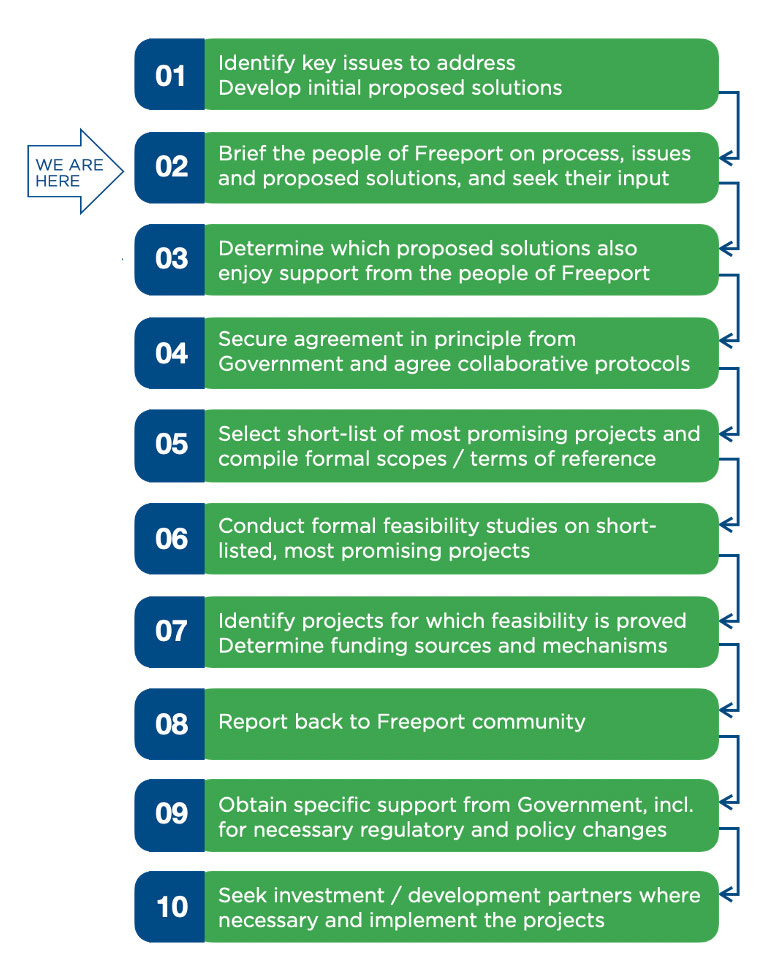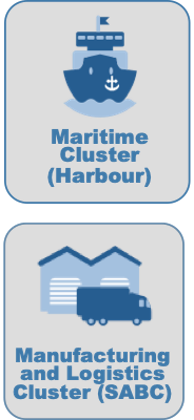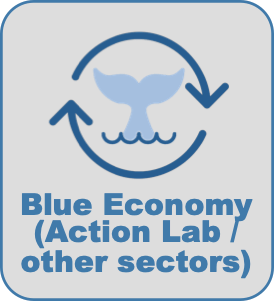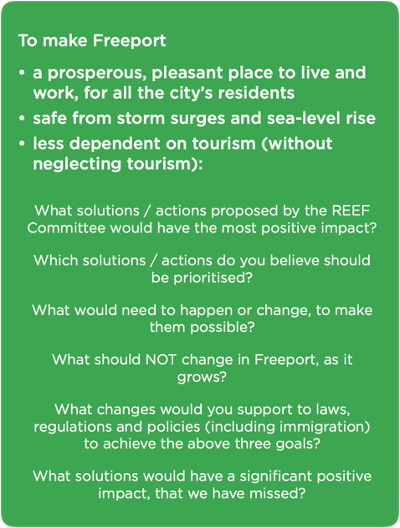Home » About
About The REEF Committee
Overview

What the REEF committee process is about
- Hurricane Dorian and Covid-19 have overturned assumptions about Freeport’s economy. To prosper and grow in the future, we need to change the way we think today.
- The REEF Committee is an initiative created by the GBPA to engage with its licensees, the wider Freeport community and anyone else who has an interest in Freeport’s success.
- The REEF Committee’s intent is to produce an ACTION PLAN that includes immediate short-term steps to make it easier for businesses to recover and grow NOW, and larger-scale, longer-term projects aimed at transforming Freeport.
- The key objectives are to:
- Create new business and employment opportunities for Freeport’s residents to thrive;
- Protect Freeport city against storm surges and possible future sea-level rise;
- Reduce our over-dependence on tourism, by growing other industry sectors (but not neglecting tourism in the process.)
- The REEF Committee is intended to supplement and support the work of the Government’s Economic Recovery Committee in Freeport or, more specifically, in the Port Area as defined in the Hawksbill Creek Agreement (HCA). This is because the HCA makes certain things possible through the GBPA, in the Port Area, that might be more difficult elsewhere in The Bahamas.
- More information on topics addressed in this summary can be found by clicking here. Please download them, study them, and let us have your thoughts.
How the process will proceed
- The REEF Committee is following a carefully designed, ten step process to ensure that short-term solutions have the greatest immediate impact and that long-term projects are technically feasible, financially viable, and will deliver the results that we need for Freeport to prosper.
- To deliver transformational results requires bold and courageous thinking, but without being unrealistic.
- Through this public consultation step now under way and afterwards and discussions with Government, the REEF Committee will select a short-list of projects on which to conduct detailed feasibility assessments.
- Implementation of short-term solutions needs to commence as soon as possible. Some are already under way.

The most important solutions proposed by the REEF Committee
Immediate solutions (implement within 1 – 6 months)
1. Extend Real Property Tax (RPT) exemption to all GBPA licensees and residents
In 2016, RPT exemptions and other concessions were extended for 20 years for some, not all GBPA licensees. This needs to be extended to all licensees and residents for the same period, so that those businesses can have the confidence to plan and invest for the future.
2. Finalize sale of Grand Bahama International Airport (GBIA) to Government
For more than a decade, GBIA has not had the passenger traffic required to make it financially viable at its pre-Dorian scale. Negotiations are underway for the Government to acquire the GBIA, which will allow the airport to be redeveloped.
3. Reinstate medical facilities (a hospital) in Freeport
While providing hospital services in Freeport is a Government, not GBPA responsibility, and the RAND hospital is the property of the Bahamas Department of Public Health, the GBPA has for some time been working with Government to provide new basic facilities and with a potential investor to develop a more sophisticated hospital that will support medical tourism, too. This must be accelerated.
4. Pass bylaws so GBPA can execute its mandate for environmental protection and urban renewal
Derelict buildings blight Freeport’s urban landscape and environmental management is substandard for a modern city. The GBPA has drafted bylaws that will allow it to demolish derelict buildings, after reasonable notice to owners, and recover the costs of that from the owners. Approval is required from Government to promulgate these bylaws, so that the GBPA can begin reversing the urban decay.
5. Enhance ease of doing business in Freeport
Besides extending the 2016 HCA concessions to all until 2036, many other opportunities exist for GBPA and Government to collaborate to make it easier to do business in Freeport. Administrative processes and systems can be simplified, made more transparent and predictable and provided through online platforms. Duplication can be eliminated. As many as possible of these inefficiencies need to be resolved as quickly as possible, especially where they impact negatively on Freeport’s businesses and residents.
The most important solutions proposed by the REEF Committee
Medium/longer term solutions (implement within 6 – 36 months)
6. Align immigration regulations and policies with Freeport’s needs – today and in the future
Streamline the current process to create a single application for companies wanting to benefit from the new Bahamas Commercial Enterprise Act (CEA), the Bahamas Extended Stay Visa Program for persons wishing to work or study from The Bahamas for a year and the benefits attached to the BH1B Visa program related to foreign direct investment. If the feasibility and scale of the opportunity of SEZs is proven, develop immigration requirements for SEZs specifically, that is required for them to succeed.
7. Digitalize all possible administrative GBPA and Government processes
The digital revolution is sweeping The Bahamas as it is the rest of the world, and this offers the opportunity to deliver world-class municipal, business, investor and resident services more efficiently, transparently and at lower cost. It also removes the need to queue or interact closely with others in today’s Covid-19 world.
8. Explore new opportunities for “Made in The Bahamas” products and services
Changes in China/US relations, socio-political developments in Hong Kong, Changes in tax in OECD* and other developed economies especially in Europe and other trends create new opportunities for goods and services destined for both North and South America to be manufactured in The Bahamas. We need to find ways to attract the kind of companies that would be interested in these opportunities, to Freeport.
9. Develop an investment promotion agency (IPA) to promote Freeport
We foresee an independent IPA to promote Freeport (especially industry sectors other than tourism, which is already serviced by other channels.) It would be overseen by a board consisting of Government, GBPA and selected independent directors, and headed up by an investment promotion expert who is recruited for proven international credentials.
*Organisation for Economic Co-operation and Development (Member states: Austria, Australia, Belgium, Canada, Denmark, Finland, France, Germany, Greece, Iceland, Ireland, Italy, Japan, Luxembourg, New Zealand, The Netherlands, Norway, Portugal, Spain, Sweden, Switzerland, Turkey, UK, USA.)
The most important solutions proposed by the REEF Committee
Medium/longer term solutions (implement within 6 – 36 months)
10. Investigate the feasibility of Special Economic Zones (SEZs) in Freeport and, if proven, make them the centerpiece of Freeport’s economic development plan, going forward
A separate deck is available on the REEF Committee pages of the GBPA website, outlining what SEZs are, and what they might mean for Freeport. If they can be as successfully implemented in Freeport as they have been in other parts of the world, they could be transformational not only for Freeport but the entire country. (Freeport’s existing SEZ value proposition is not competitive.)
11. A new master plan for Freeport, well integrated into a wider plan for Grand Bahama Island
Develop a proper new urban development plan incorporating the most appropriate, modern, sustainable thinking, for Freeport – fully integrated into a similar plan for the whole of GBI that optimizes the linkages and opportunities for communities outside the Port Area, with the city of Freeport.
12. Enhance Grand Bahama’s tourism sector
Work to adapt Grand Bahama’s tourism sector to post-Covid realities, seeking opportunities (e.g. demand for new kinds of ‘socially-distanced’ tourism) as well as addressing challenges.
13. Enhancing the capacity of Freeport’s micro and small businesses
Any growth, and certainly growth at the scale that could be catalyzed by SEZs at scale, would create significant demand for small Bahamian enterprises (e.g. shops, restaurants, a wide range of service businesses.) A critical mass of Bahamian entrepreneurs are needed to establish and run these businesses, and employees to work in them. Establish initiatives that include training, business mentoring support and access to finance to allow existing and new micro and small businesses to thrive in Freeport and across wider Grand Bahama Island.
14. Enhance food self-reliance, quality and sustainability
Significantly expand and enhance the agricultural sector, to reduce dependency on off-island sources.
The character that Freeport develops in years to come will depend largely on the specific projects that are selected for implementation, and the degree to which the city can be safeguarded against storm-surges and possible future sea-level rise. Some initial ideas have been proposed by the REEF Committee, as a framework within which to develop the projects and a new master plan. In the survey, you are asked for your views on these overarching themes.
Build out the Maritime and Logistics sector – ‘The Maritime Center of the Americas’

The Bahamas is a nation of islands and seas. Alongside tourism, its maritime industry is well established at the core of Freeport’s economy. It would therefore make sense to focus on building out the industrial areas adjacent to Freeport Harbour, including the ‘Sea Air Business Centre’ and GBIA (if they can be protected from storm surges) to create a globally significant maritime centre. The Bahamas Maritime Association could be relocated to Freeport and the city marketed to shipping and related companies for a wide range of facilities and services. Branding the non-tourism component of Freeport as ‘The Maritime Center of the Americas’ would not preclude investment in any other appropriate industry sectors. It would serve as a way of making Freeport distinctive in the minds of investors.
Branding using the ‘Blue Economy’ as a/the core theme

Increasing interest in sustainability and the threats posed by climate changed are creating a projected $23 trillion market for coastal resilient solutions. Branding Freeport overall with a ‘Blue Economy’ theme and creating an environment that is especially attractive to companies and others developing such solutions might be a good idea. Many of the REEF Committee’s proposed solutions have a strong ocean component to it and the Bahamian tourism product is inextricably linked to the sea and seashore. It would also link well with the Maritime theme.
“Grand Bahama” versus “Freeport”
We propose using ‘Grand Bahama’ when branding the tourism sector (island-wide) and the more commercial term ‘Freeport’ when branding the other, commercial/industrial sectors.
How you can help
We need your feedback and input!
We need you to add your voice, thoughts and ideas to help shape the future of Freeport and chart a bold new way forward for our city.
Please complete the survey by visiting reef.gbpa.com/survey and/or email other written input that you have to info@gbpa.com.
Anyone with an interest in Freeport and its people is welcome to participate.
Every idea, comment, and feedback is valuable and will be considered.
We do not expect everyone to agree.
We expect new and different points of view to be shared.
Help us fine-tune Freeport to fit your needs

Committee Members
The Revitalization and Economic Expansion of Freeport (REEF) Committee is comprised of a cross-section of leaders representing a wide spectrum of Freeport’s businesses. The following are REEF’s inaugural members:
- Sarah St. George
- Ian Rolle
- Deann Seymour
- Henry St. George
- Rupert Hayward
- Willie Moss
- Fred Smith QC
- Robert Adams (Committee Lead)
- Giora Israel
- Godfrey Smith
- Pietro Stefanutti
- Dave McGregor
- Dave Skentlebery
- Keith Davies
- Ellie Hepburn
- Greg Ebelhar
- Sandy Sawyer
- Erika Gates
- Jeremy Cafferata
- Sean Basden
- Darren Cooper
- Derek Newbold
- Philcher Grant
- James Sarles
- Claudette Porter
